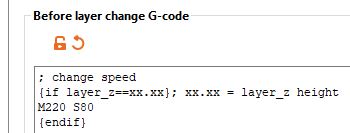Speed change in GCode
Not sure how to word this but here it is goes! Does anyone know how to set the print speed % with GCode? I would like to print the first few layers at 75 or 80% then increase to 100% for another few layers then maybe go up to 125% for the rest of the print. I pretty much do this manually and it has given me god prints but that means I am always going to check on it and I would just like to automate it.
Re: Speed change in GCode
Have not tried this myself, but if you issue M221 Sxxx where xxx is the desired percentage you should be able to adjust speeds per layer in gcode. If you are using Slic3rPE, under Printer Settings->Custom G-Code->Before layer change G-code try something like:
Not sure how to word this but here it is goes! Does anyone know how to set the print speed % with GCode? I would like to print the first few layers at 75 or 80% then increase to 100% for another few layers then maybe go up to 125% for the rest of the print. I pretty much do this manually and it has given me god prints but that means I am always going to check on it and I would just like to automate it.
M221 S{if layer_z < 3}75{else}100{endif}
and miscellaneous other tech projects
He is intelligent, but not experienced. His pattern indicates two dimensional thinking. -- Spock in Star Trek: The Wrath of Khan Unfortunately,…
Re: Speed change in GCode
The OP didn't thank you, but I will as this seems what I am looking for - automated speed increase as opposed to manually adjusting the front panel knob.
What I need to research is - what does the front panel knob do when you increase the speed % - flow or feed ?
Texy
RE: Speed change in GCode
Thanks for the tip, Bobstro!
You can also set a slower 1st layer speed in PrusaSlicer in the Speed area of the Print Settings tab.
RE: Speed change in GCode
Glad it's helpful. Sorry, didn't see the previous question about what M221 changes. It changes all feed rates, essentially speeds, for XYZ & E axis.
and miscellaneous other tech projects
He is intelligent, but not experienced. His pattern indicates two dimensional thinking. -- Spock in Star Trek: The Wrath of Khan Unfortunately,…
RE: Speed change in GCode
Where is the gcode database ?
RE: Speed change in GCode
Where is the gcode database ?
- You can find the Marlin gcode documentation here
- You can find an incomplete list of gcodes implemented in the Mk3 firmware here.
and miscellaneous other tech projects
He is intelligent, but not experienced. His pattern indicates two dimensional thinking. -- Spock in Star Trek: The Wrath of Khan Unfortunately,…
RE: Speed change in GCode
Not sure how to word this but here it is goes! Does anyone know how to set the print speed % with GCode? I would like to print the first few layers at 75 or 80% then increase to 100% for another few layers then maybe go up to 125% for the rest of the print. I pretty much do this manually and it has given me god prints but that means I am always going to check on it and I would just like to automate it.
Have you ever tested it with the M220 function?
e.g.:
M220 -> https://marlinfw.org/docs/gcode/M220.html
wbr,
Karl
Statt zu klagen, dass wir nicht alles haben, was wir wollen, sollten wir lieber dankbar sein, dass wir nicht alles bekommen, was wir verdienen.
RE: Speed change in GCode
e.g.:
Ah, good catch! I mentioned M221 which is the extrusion rate. OP wants M220 which is feed rate.
Be careful using "==" in layer_z comparisons. If your layer height is not exactly the specified value, the test will fail. If you change your 1st layer height or print layer heights, you may never print at exactly the desired height. I find it safer to use ">=" or "<=" for gcode height comparisons.
and miscellaneous other tech projects
He is intelligent, but not experienced. His pattern indicates two dimensional thinking. -- Spock in Star Trek: The Wrath of Khan Unfortunately,…
RE: Speed change in GCode
@bobstro,
only an example. You could make arithmetical operations with "first_layer_height" and "layer_height" instead of constant values.
e.g.: change speed on 4. layer:
{if layer_z==first_layer_height+layer_height*3}; z height
M220 S80
{endif}
wbr,
Karl
Statt zu klagen, dass wir nicht alles haben, was wir wollen, sollten wir lieber dankbar sein, dass wir nicht alles bekommen, was wir verdienen.



